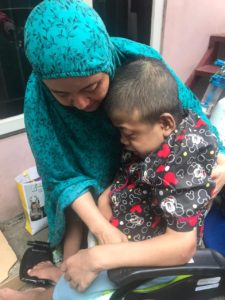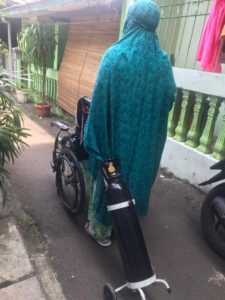 2004. The boy was born and looked normal like any other babies. Rei, the cute baby boy, was her only source of joy and hope after her first son died when he was just 2 years old and the second was miscarried when he was only 5 weeks. Her husband left her when she was just 3 months pregnant and divorced her 2 months after Rei was born. Now it was just the two of them, mother and son, in a very small house rented by her brother in one of the marginalized areas in Jakarta. With no job or money, she tried to be strong and stay alive day-by-day relying on the kindness and food given from her surrounding neighbors. At times, she had to fast. “As long as Rei has something to eat,” she smiled.
2004. The boy was born and looked normal like any other babies. Rei, the cute baby boy, was her only source of joy and hope after her first son died when he was just 2 years old and the second was miscarried when he was only 5 weeks. Her husband left her when she was just 3 months pregnant and divorced her 2 months after Rei was born. Now it was just the two of them, mother and son, in a very small house rented by her brother in one of the marginalized areas in Jakarta. With no job or money, she tried to be strong and stay alive day-by-day relying on the kindness and food given from her surrounding neighbors. At times, she had to fast. “As long as Rei has something to eat,” she smiled.
During his childhood, Rei was a bit shorter than the other kids his age. His legs seemed small, but his head was a bit large and he had that face like a grown adult. He grew up with less activities because he was too weak to walk. He would lie down the whole day and snore a lot when he slept. At this point, she thought it was normal for a fat boy like him to do such things.
2018. Rei didn’t react like he used to. He was starting to lose his sense of hearing and speech. She realized something must have gone wrong. She decided to get him checked. The result saddened her. Rei was diagnosed to have a rare genetic disorder called Mucopolysaccharidosis type II (MPS II). This disease is caused by a missing or malfunctioning enzyme. Life expectancy is about 10 to 20 years of age and while the disease progresses, the patient will experience permanent, progressive damage affecting appearance, mental development, organ function, and physical abilities. Although incurable, the doctor suggested he take enzyme therapy to maintain his health. She couldn’t afford it as it wasn’t covered by BPJS (the national insurance scheme).
October 2020. Rei was suffocating. She rushed him to Cipto Mangunkusomo Hospital (a national referral hospital) and he had to undergo surgery to open the breathing passage. The tonsils apparently had grown bigger and obstructed the air passage. Since then, going to hospitals and carrying oxygen tanks while making sure Rei is comfortable has to be done regularly. Alone. And the fact that the COVID-19 virus is still lurking and posing a threat, these visits to the hospital have become more perilous.

“One or two times, I really wanted to give up and just end all of this. Doing this all by myself is really exhausting but then I thought who will take care of Rei if I am gone?” she smiled sadly, yet her eyes were full of determination, and continued to suck phlegm out of her son’s throat to clear the air passage. She does this day and night. Getting up at 2 a.m. to do this night vigil has become her regular habit to make sure that he is able to breathe effortlessly. She doesn’t mind. “The sound of his snores is now like music to my ears. I can’t sleep without hearing it,” she smiled as she gently wiped her son’s face, feeling grateful that she was still able to have 16 years of togetherness with her boy.
The nurses from Rachel House have regularly paid visits to Rei’s house not only to provide free palliative care and bring other daily necessities for Rei but also to help and support his mother so that they won’t have to go through this difficult journey alone. The nurses’ presence has become a comfort to both mother and son. Rachel House acknowledges that many children with terminal illnesses, especially from marginalized areas, have often gone unheard and unseen. It aims, therefore, to strive its best so that these children can have a life free from pain and have a joy for as long as they live.
Now as Rei’s condition is deteriorating, he can no longer see, nor hear, nor speak. He only produces feeble sound here and there to show that he is in pain. He knows his mother is there day and night, caring for him, trying to soothe him. He can feel her love.
If you would like to help give sparks of joy to the children we care for at Rachel House, please donate to support our work.